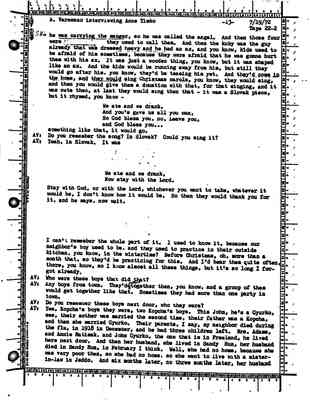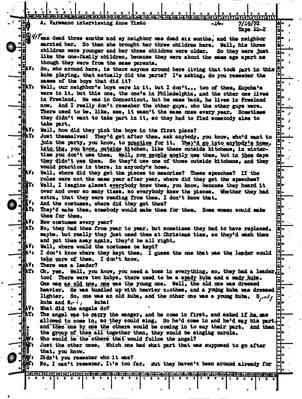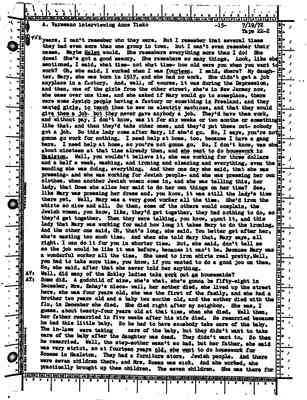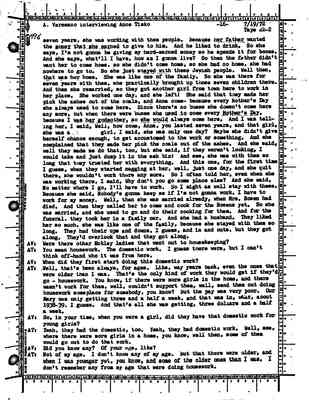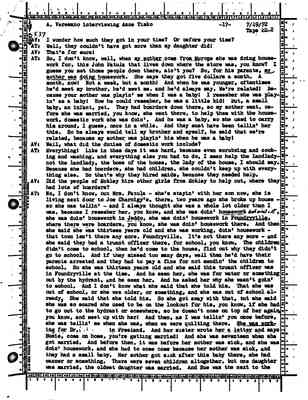Pages
48
A. Varesano interviewing Anne Timko -13- 7/19/72 Tape 22-2
he was carrying the manger, so he was called the angel. And then those four were they used to call them. And then the kuby was the guy already that was dressed heavy and he had an ax, and you know, kids used to be afraid of him sometimes, because they were afraid that he was gonna hurt them with his ax. It was just a wooden thing, you know, but it was shaped like an ax. And the kids would be running away from him, but still they would go after him, you know, they'd be teasing him yet. And they'd come in the home, and they woudl sing Christmas carols, you know, they would sing, and then you would give them a donation with that, for that singing, and it was cute then, at last they would sing then that - it was a Slovak piece, but it rhymed, you know - We ate and we drank, And you's give us all you can, So God bless you, no, Leave you, And God bless you... something like that, it would go. AV: Do you remember the song? In Slovak? Could you sing it? AT: Yeah, in Slovak. It was We ate and we drank, Now stay with the Lord. Stay with God, or with the Lord, whichever you want to take, whatever it would be, I don't know how it would be. So then they would thank you for it, and he says, now wait.
I can't remember the whole part of it. I used to know it, because our neighbor's boy used to be, and they used to practice in their outside kitchen, you know, in the wintertime? Before Christmas, oh, more than a month that, so they'd be practicing for this. And I'd hear them quite often, there, you know, so I know almost all these things, but it's so long I forgot already. AV: Who were these boys that did that? AT: Any boys from town. They'd get together then, you know, and a group of them would get together like that. Sometimes they had more than one party in town. AV: Do you remember thse boys next door, who they were? AT: Yes. Kopcha's boys were there, two Kopcha's boys. This John, he's a Gyurko, see, their mother married the second time, their father was a Kopcha, and then she married Gyurko. Their parents, I say, my neighbor died during the flu, in 1918 in December, and he had three children left. Mrs. Adams, and Annie Matisak, and John Gyurko, the one that is in Freeland, he lived here next door. And then her husband, she lived in Sandy Run, her husband died in Sandy Run, in February I think. Well, she had no home, because she was very poor then, so she had no home, so she went to live with a sister-in-law in Jeddo. And six months later, no three months later, her husband
49
A. Varesano interviewing Anne Timko -14- 7/19/72 Tape 22-2
was dead three months and my neighbor was dead six months, and the neighbor married her. So then she brought her three children here. Well, his three children were younger and her three children were older. So they were just like the one-family children, because they were about the same age apart as though they were from the same parents. AV: So, who around here, is there anyone around here living that took part in this kuba playing, that actually did the parts? I'm asking, do you remember the names of the boys that did it? AT: Well, our neighbor's boys were in it, but I don't...two of them, Kupcha's were in it, but this one, the one's in Philadelphia, and the other on lives in Freeland. He was in Connecticut, but he came back, he lives in Freeland now. And I really don't remember the other guys, who the other guys were. There used to be, like, see, it wasn't the same ones every year. Sometimes they didn't want to take part in it, so they had to find somebody else to take part. AV: Well, how did they pick the boys in the first place? AT: Just themselves! They'd get after them, ask anybody, you know, who'd want to join the party, you know, to practice for it. They'd go into anybody's home, into the, you know, outside kitchen, like these outside kitchens, in wintertime you don't use them. Well, now people mostly use them, in but them days they didn't use them. So, they'd use one of those outside kitchens, and they would practice in there, in anybody's home. AV: Well, where did they get the pieces to memorise? These speeches? If the roles were not the same year after year, where did they get the speeches? AT: Well, I imagine almost everybody knew them, you know, because they heard it over and over so many times, so everybody knew the pieces. Whether they had extra, that they were reading from them, I don't know that. AV: And the costumes, where did they get them? AT: They'd make them, somebody would make them for them. Some women would make them for them. AV: New costumes every year? AT: No, they had them from year to year, but sometimes they had to have replaced, maybe, but really they just used them at Christmas time, so they'd wash them and put them away again, they'd be all right. AV: Well, where would the costuemes be kept? AT: I don't know where thye kept them. I guess the one that was the leader would take care of them. I don't know. AV: There was a leader? AT: Oh, yes. Well, you know, you need a boss in everything, so, they had a leader too! There were two kubys, there used to be a spady kuba and a mady kuba. One was an old one, one was the young one. Well, the old one was dressed heavier. He was bundled up with heavier clothes, and a young kuba was dressed lighter. So, one was an old kuba, and the other one was a young kuba. Spady kuba and Mady kuba! AV: What did the angels do? AT: The angel was to carry the manger, and he came in first, and asked if he was allowed to come in, so they could sing. So he'd come in and he'd say his part and then one by one the others would be coming in to say their part. And then the group of them all together then, they would be singing carols. AV: Who would be the others that would follow the angels? AT: Just the other ones. Which one had what part that was supposed to go after that, you know. AV: Didn't you remember who it was? AT: No, I can't remember. It's too far. But they haven't been around already for
50
A. Varesano interviewing Anne Timko -15- 7/19/72 Tape 22-2
years, I can't remember who they were. But I remember that several times they had even more than one group in town. But I can't even remember their names. Maybe Helen would. She remembers everything more than I do! She does! She's got a good memory. She remembers so many things. Look, like she mentioned, I said, what time - not what time - how old were you when you went to work? Oh, she said, I worked when I was fourteen. I said, Where? My daughter, Mary, she was born in 1917, and she had no work. She didn't get a job anyplace in a factory. And, well, of course, it was during the Depression, and then, one of the girls from the other street, she's in New Jersey now, she came over one time, and she asked it Mary would go to someplace, there were some Jewish people having a factory or something in Freeland, and they wanted girls, to teach them to sew on electric machines, and that they would give them a job, but they never gave anybody a job. They'd have them owrk, and without pay, I don't know, was it for six weeks or two months or something like that, and then they'd take other ones, and they'd put these out - nobody got a job. So this lady come after Mary, if she'd go. No, I says, you're not gonna work for nothing. I need help at home, too, because I have a gang here. I need help at home, so you're not gonna go. So, I don't know, was hse about nineteen at that time already then, and she went to do housework in Hazleton. Well, you wouldn't believe it, she was working for three dollars and a half a week, washing, and ironing and cleaning and everything, even the mending she was doing, everything. And then one day she said, that she was pressing - and she was working for Jewish people - and she was pressing her own clothes, when another Jewish woman come in, and she was telling this, her lady, that Does she allow her main to do her own things on her time? See, like Mary was pressing her dress and, you now, it was still the lady's time there yet. Well, Mary was a very good worker all the time. She'd iron the shirts so nice and all. So then, some of the others would complain, the Jewish women, you know, like, they'd get together, they had nothing to do, so they'd get together. Then they were talking, you know, about it, and this lady that Mary was working for said how long it takes Mary to do the ironing. And the other one said, Oh, that's long, she said, You better get after her, she's wasting too much time. ANd when she told Mary that, Mary says, all right. I can not it for you in shorter time. But, she said, don't tell me so the job sould be like it was before, because i can't be. Because Mary was a wonderful worker all the time. She used to iron shirts real pretty. Well, you had to take more time, you know, if you wanted to do a good job on them. So, she said, after that he never told her anything. AV: Well, did many of the Eckley ladies take work out as housemaids? AT: Some did. A godchild of mine, she's what, she's gonna be fifty-eight in December, Mrs. Zahay's niece- well, her mother died, she lived up the street here, she was four years old, she was the first of the family, and she had a brother two years old and a baby two month old, and the mother died with the flu, in December she died. She died right after my neighbor. She was, I guess, about twenty-four years old at the time, when she died. Well then, her father remarried in five weeks after his wife died. He remarried because he had this little baby. So he had to have somebody take care of the baby. The in-laws were taking care of the baby, but they didn't want to take care of the baby after the daughter was dead. They didn't want to. So then he remarried. Well, the step-mother wasn't so bad, but her father, she said was very strict, so at fourteen years old, she went to do housework for Rosens in Hazleton. They had a furniture store. Jewish people. And there were seven children there, and Mrs. Rosen was sick. And she worked, she practically brought up them children. The seven children. She was there for
51
A. Varesano interviewing Anne Timko -16- 7/19/72 Tape 22-2
seven years, she was working with them people. Because her father wanted the money that she earned to give to him. And he liked to drink. So she says, I'm not gonna be giving my hard-earned money so he spends it for booze. And she says, what'll I have, how am I gonna live? So then the father didn't want her to come home, so she didn't come home, so she had no home, she had nowhere to go to. So she just stayed with these Jewish people. Well then, that was her home. She was like one of the family. So she was there for seven years with them, she practically brought up those seven children there. And then she remarried, so they got another girl from town here to work in her place. She worked one day, and she left! She said that they made her pick the ashes out of the coals, and Anna come - because every Mother's Day, because I was her godmother, so she would always come here. And I was telling her, I said, Well, how come, Anna, you lasted seven years, and that girl, she was a girl, I said, she was only one day? Maybe she didn't give herself chance enough, to get accustomed to the work or something. And she complained that they made her pick the coals out of the ashes. And she said, well they made me do that, too, but she said, if they weren't looking, I would take and just dump it in the ash bin! And see, she was with them so long that they trusted her with everything. And this one, for the first time I guess, when they started nagging at her, well, just one day, and she quit there, she wouldn't work there any more. So I often told her, even when she was working there, I said, Why don't you go some place else? And she said, No matter where I go, I'll have to work. So I might as well stay with these. Because she said, Nobody's gonna keep me if I'm not gonna work. I have to work for my money. Well, then she was married already, when Mrs. Rosen had died. And then they called her to come and cook for the Rosens yet. So she was married, and she used to go and do their cooking for them. And for the funeral. they took her in a family car. And she had a husband. They liked her so much, she was like one of the family, because she stayed with them so long. They had their ups and downs, I guess, and in and outs, but they got along. They'd overlook that and they got along. AV: Were there other Eckley ladies that went out to housekeeping? AT: You mean housework. The domestic work. I guess there were, but I can't think off-hand who it was from here. AV: When did they first start doing this domestic work? AT: Well, that's been always, for ages. Like, way years back, even the ones that were older than I was. That's the only kind of work they would get if they'd go - housework. You know, if there were more girls in the home, and there wasn't work for them, well, couldn't support them, well, send them out doing housework someplace for somebody, you know? But the pay as very poor. Our Mary was only getting three and a half a week, and that was in, what, about 1938-39, I guess. And that's all she was getting, three dollars and a half a week. AV: So, in your time, when you were a girl, did they have that domestic work for young girls? AT: Yeah, they had the domestic, too. Yeah, they had domestic work. Well, see, where there were more girls in a home, you know, well then, some of them would go out to do that work. AV: Did you know any? Of your age, like? AT: Not of my age. I don't know any of my age. But that there were older, and when I was younger yet, you know, and some of the older ones that I was. I don't remember any from my age that were doing housework.
52
A. Varesano interviewing Anne Timko -17- 7/19/72 Tape 22-2
AV: I wonder how much they got in your time? Or before your time? AT: Well, they couldn't have gor more than my daughter did! AV: That's for sure! AT: So, I don't know, well, when my mother come from Europe she was doing housework for, this John Fatula that lives down where the store was, you know? I guess you met those people down there, ain't you? So, for his parents, my mother was doing housework. She says they got five dollars a month. A month, now! Not a week, but a month! And when he was younger, oftentimes he'd meet my brother, he'd meet me, and he'd always say, We're related! Because your mother was playin' me when I was a baby! I remember she was playin' as a baby! How he could remember, he as a little kid! But, a small baby, an infant, yet. They had boarders down there, so my mother went, before she was married, you know, she went there, to help them with the housework, domestic work she was doin'. And he was a baby, so she used to carry him around, I guess, once in a while. And they must have been tellin' her this. So he always would tell my brother and myself, he said that we're related, because my mother was playin' him when he was a baby! AV: Well, what did the duties of domestic work include? AT: Everything! Like in them days it was hard, because even scrubbing and cooking and washing, and everything else you had to do, I mean help the landlady - not the landlady, the boss of the house, the lady of the house, I should say. Because she had boarders, she had children, she couldn't keep up with everything else. So that's why they hired maids, because they needed help. AV: Did the people of Eckley hire other girls from Eckley to help out, where they had lots of boarders? AT: No, I don't know, but Mrs. Fatula - she's stayin' with her son now, she is living next door to Joe Charnigy's, there, two years ago she broke up house so she was tellin' - and I always thought she was a whole lot older than I was, because I remember her, you know, and she was doin' housework, she was don' housework in Jeddo, she was doin' housework in Foundryville, where there were boarders, you know, she was doing' housework there. And then she said she was thirteen years old and she was working, doin' housework - that town isn't there any more, Foundryville. It's not there any more - and she said they had a truant officer there, for school, you know. The children didn't come to school, then he'd come to the house, find out why they didn't go to school. And if they missed too many days, well then he'd have their parents arrested and they had to pay a fine for not sendin' the children to school. SO she was thirteen years old and she said this truent officer was in Foundryville at the time. And he seen her, she was for water or something out by the hydrant, and he seen her. And he asked her why she wasn't goin' to school. And I don't know what she said that she told him. That she was out of school, or she was older, or something, and she was out of schoool already, She said that she told him. So she got away with that, but she said she was scared she used to be on the lookout for him, you know, if she had to go to the hydrant or somewhere, so he doesn't come on top of her again, you know, and meet up with her! And then, as I was tellin' you once before, she was tellin' me when she was, when we were quilting there. She was working for Dr. in Freeland. And her sister wrote her a letter and says Susie, come on home, you're getting married! And she was seventeen when she got married. And before then, it was before her mother was sick, and they had a small baby. Her mother got sick after this baby there, she had cancer or something. There were seven children altogether, but one daughter was married, the oldest daughter was married. And Sue was the next to the
